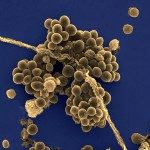Lien vers Pubmed [PMID] – 16822689
Microbes Infect. 2006 Jun;8(7):1714-22
Group B streptococcus (GBS) is a leading cause of neonatal morbidity and mortality. Multilocus sequence typing (MLST) revealed that the sequence type ST-17 defines a “highly virulent” serotype III clone strongly associated with neonatal invasive infections. Our aim was to identify a target sequence enabling rapid, simple, and specific detection of this clone by a real-time PCR assay. Conventional methods for DNA manipulation and gene analyses were used to characterize the gbs2018 gene variant specific for ST-17 clone and to design ST-17- and GBS-specific primers. Conventional and real-time PCR assays were developed to detect GBS and ST-17 clones in bacterial cultures and directly on clinical samples. One hundred and fifty-six French GBS strains from various geographical areas in France isolated between 1990 and 2005 were screened by PCR with ST-17-specific primers. Forty strains were positive, and all were validated by MLST as ST-17. A representative sampling of 49 ST-17-PCR-negative strains was confirmed by MLST as non-ST-17. Real-time PCR was further used to directly test 85 vaginal samples. Among these, 13 were GBS-positive, and one was identified as ST-17. The association between strain invasiveness and ST-17 lineage in neonates with late onset disease was highly significant: 78% (P<0.0001) of strains isolated were ST-17. In conclusion, an ST-17-specific gbs2018 allele was identified and used to develop a sensitive and specific rapid-screening molecular assay for identifying ST-17 "highly virulent" GBS. Using this technique, accurate identification of women and neonates colonized by ST-17 can be readily achieved within less than 2 h.

